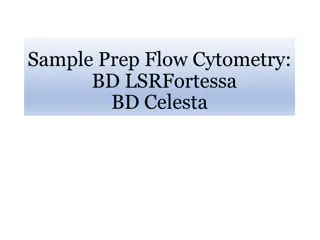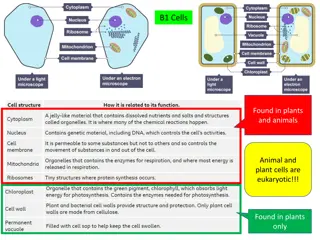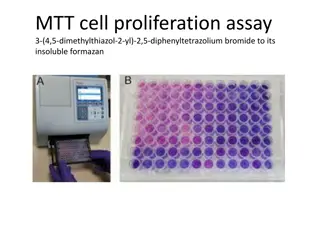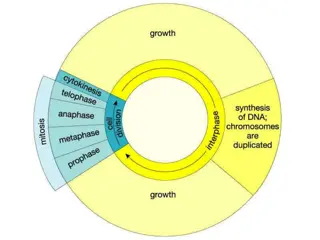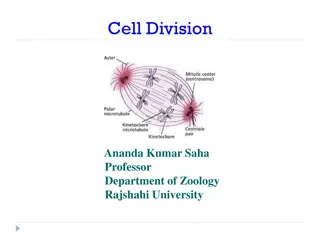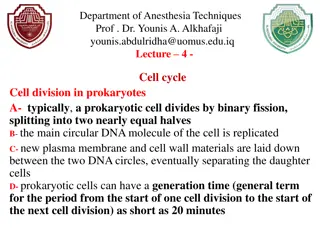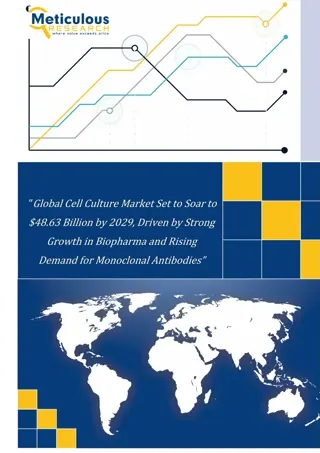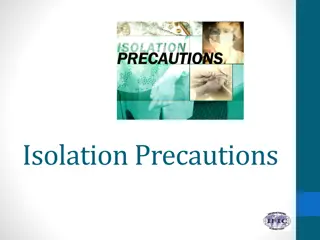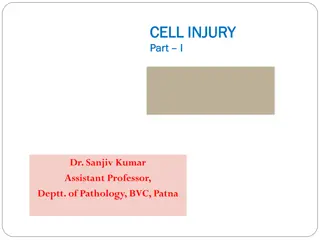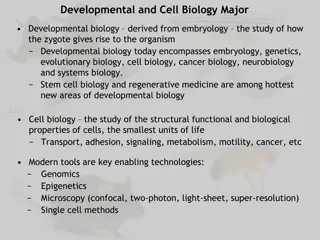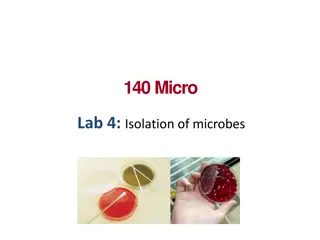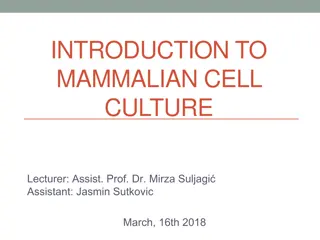Vi-CELL.BLU - Advanced Cell Counting Instrument
Vi-CELL.BLU is a cutting-edge cell counting instrument that offers faster analysis, increased resolution, and improved optical sensor technology for enhanced cell concentration and viability assessments. The device features a user-friendly interface, Trypan blue method for live cell detection, and a
1 views • 19 slides
Understanding Virus-Cell Interactions: Mechanisms and Consequences
Viruses interact with host cells in various ways, encoding genes that manipulate cell functions for their benefit. These interactions can range from benign to lethal outcomes. Factors influencing these interactions include viral factors, cellular responses, and the presence of virulence factors. Dif
0 views • 37 slides
Understanding Cell Reproduction and the Cell Cycle
Explore the process of cell reproduction, DNA structure, chromosomes, and the differences between prokaryotic and eukaryotic cell cycles. Learn about binary fission, mitosis, and cytokinesis in the context of cellular growth and division. Understand the significance of genes, DNA organization into c
5 views • 56 slides
Understanding Cell Viability Assays in Laboratory Testing
Cell viability assays play a crucial role in determining the health and status of cells, measuring their ability to survive and proliferate. These assays involve various techniques such as dye exclusion, colorimetric, fluorometric, luminometric, and flow cytometric assays. By assessing factors like
6 views • 16 slides
Understanding Cell Division: Functions and Stages
Explore the functions and stages of cell division through a comprehensive overview covering topics such as the importance of cell division in growth, repair, and reproduction, the stages of the cell cycle, and the comparison of different cell cycles. Engage with visual aids and concept maps to deepe
5 views • 43 slides
Guidelines for Setting up Isolation Facility/Ward for Covid-19 Management
Quarantine and isolation measures are crucial for breaking the chain of transmission in the community. Isolation involves separating individuals who are ill or suspected of having COVID-19, while quarantine is for those exposed and potentially at risk. Specific protocols and facilities are necessary
1 views • 33 slides
Understanding Isolation and Virtualization in Operating Systems
This text delves into the concepts of isolation and virtualization in operating systems. It covers topics such as virtual memory, virtual machines, containers, and kernel isolation mechanisms like chroot and cgroups. The discussion explores how these techniques provide isolation between processes, c
5 views • 20 slides
Bacterial Cell Structure and Composition Overview
Bacterial cells exhibit variations in size, typically ranging from 0.75 to 1.5 micrometers. The cell envelope, comprising glycocalyx, cell wall, and cell membrane, plays crucial roles in protection and cell function. The cell membrane, a thin barrier rich in phospholipids and proteins, is integral t
1 views • 28 slides
An Overview of Cell Biology: From Cytology to Modern Studies
Cell biology, also known as cytology, explores cells from various perspectives including physiological, developmental, and evolutionary aspects. Modern Cell Biology delves into the mechanisms of metabolism, heredity, and evolution at the molecular level, involving proteins, RNAs, and DNA. The compar
0 views • 13 slides
Understanding BD FACS Aria III for Efficient Cell Sorting
Learn about the BD FACS Aria III, a sterile cell sorter capable of analyzing up to 15 colors and sorting up to 4 populations simultaneously. Recommended sample concentrations, sorting procedures, and tube preparation guidelines are provided for efficient cell sorting. Discover important tips to ensu
1 views • 12 slides
Overview of Cell Culture Methods and Importance in Research
Introduction to the principles of cell culture, including tissue culture, organ culture, and cell culture methods. Discusses the advantages and disadvantages of each technique and highlights the need for cell culture in research for studying cellular behavior and large-scale production of cell mater
3 views • 45 slides
Revised Guidelines for Home Isolation of COVID-19 Cases in India
The Ministry of Health & Family Welfare in India has issued revised guidelines for home isolation of very mild/pre-symptomatic/asymptomatic COVID-19 cases. Patients eligible for home isolation must have the necessary facility for self-isolation. Special considerations apply to elderly patients and t
2 views • 16 slides
Updates to Isolation Index and Targeted Funding for Remote Schools
The Isolation Index introduced in 2001 to identify remote schools is being updated to better allocate funding based on isolation levels. Changes include using updated population and road data, redefining isolation criteria, and revising funding formulas. The goal is to accurately support the most is
1 views • 6 slides
Understanding Flow Cytometry Instrumentation and Cell Preparation
Flow cytometry is a valuable technique for analyzing multiple characteristics of cell populations. This overview delves into the features of BD LSRFortessa and BD Celesta flow cytometers, detailing their excitation lasers and detection filters. It also highlights the importance of proper cell prepar
2 views • 12 slides
Overview of Bacterial Morphology and Cell Structure
This article discusses the morphology of both Gram-positive and Gram-negative bacteria, highlighting examples of different arrangements and shapes. It also explores the structure and functions of bacterial cell walls, emphasizing the role of teichoic acids in Gram-positive cell walls. Additionally,
1 views • 38 slides
Cell Structure and Function: A Comprehensive Overview
Delve into the world of cells, exploring the distinct features of animal and plant cells, the differences between prokaryotic and eukaryotic cells, the significance of organelles, and the fascinating processes such as stem cell differentiation and cell adaptation. Discover how substances move across
0 views • 5 slides
MTT Cell Proliferation Assay: Protocol and Applications
The MTT cell proliferation assay is a widely used technique to measure cell viability, proliferation, and cytotoxicity in research. This colorimetric assay involves the conversion of MTT reagent to formazan dye by live cells, resulting in a purple color change. This comprehensive guide provides step
0 views • 8 slides
Global Cell Isolation Market
\"The Global Cell Isolation Market Size is Anticipated to Exceed USD 13.4 Billion by 2033, Growing at a CAGR of 12.5% from 2023 to 2033. \n\"\n
0 views • 5 slides
Understanding Bacterial Cell Structure and Function
Bacteria display unique cellular structures and functions that differ from eukaryotic cells. They have a simple structure with a plasma membrane but lack complex internal membrane systems. The cytoplasm contains inclusion bodies, ribosomes, and genetic material in the nucleoid. Bacteria can be categ
4 views • 21 slides
Regulation of the Cell Cycle: A Comprehensive Overview
Variation in cell cycle length in humans, controlled by internal and external mechanisms, with special proteins and checkpoint systems ensuring proper progression. External events trigger initiation and inhibition of cell division, while internal checkpoints maintain genetic integrity and chromosome
4 views • 14 slides
Meticulous Research® Forecasts Cell Culture Market to Reach $48.63 Billion by 2029, Growing at a CAGR of 11.7%”
Cell Culture Market by Product [Consumables (Media, Reagents, Sera, Cell Lines), Equipment (Bioreactor, Centrifuge, Cell Counter)], Application (Bioproduction, Cancer Research, Stem Cell, Diagnostic), End User (Pharma, academic) - Global Forecast to
0 views • 3 slides
Understanding the Cell Cycle and Mitosis Process
The cell cycle consists of two main periods: Interphase and Mitosis. During Interphase, the cell prepares for division by growing in size and copying chromosomes. Mitosis, the division of the nucleus, results in the formation of two daughter cells with identical chromosome copies. Centrioles and cen
0 views • 26 slides
Understanding Cell Division: Processes and Types
Cell division is a vital process in living cells for growth and reproduction. This article explores the basics of cell division, including the cell cycle, types of cell division (such as mitosis and meiosis), and the initiation of cell division. It also covers key phases like interphase and provides
0 views • 20 slides
Overview of Cell Division in Prokaryotes and Eukaryotic Cells
Cell division plays a crucial role in the growth and reproduction of all organisms. In prokaryotic cells, binary fission is the primary mode of division, while eukaryotic cells undergo a more complex process involving cell growth, DNA replication, chromosome distribution, and cytokinesis. The cell c
0 views • 10 slides
How PluriBead Supports High-Quality Basophil Isolation for Immunological Studies
When it comes to high-quality cell isolation, the right technology can make all the difference. For researchers focused on basophil isolation and related immunological studies, PluriBead offers a cutting-edge solution that simplifies and enhances the
0 views • 11 slides
Global Cell Culture Market Set to Soar to $48.63 Billion by 2029, Driven by Strong Growth in Biopharma and Rising Demand for Monoclonal Antibodies
Cell Culture Market by Product [Consumables (Media, Reagents, Sera, Cell Lines), Equipment (Bioreactor, Centrifuge, Cell Counter)], Application (Bioproduction, Cancer Research, Stem Cell, Diagnostic), End User (Pharma, academic) - Global Forecast to
0 views • 5 slides
Understanding Isolation Precautions in Healthcare Settings
This content discusses the importance of isolation precautions in preventing the spread of infections in healthcare settings. It covers the rationale behind isolation precautions, types of precautions, personal protective equipment, key points related to isolation, the chain of infection, modes of i
0 views • 29 slides
Understanding Cell Injury and its Causes in Pathology
Rudolph Virchow's concept of disease starting at the cellular level is explored in this content, focusing on the impact of the external environment on cell equilibrium. The role of the plasma membrane as a barrier and the definitions of normal cell function, adaptation, reversible injury, irreversib
0 views • 16 slides
Explore the World of Developmental and Cell Biology
Developmental biology, stemming from embryology, investigates how organisms evolve from a zygote. It merges various fields like genetics, cell biology, and cancer biology. Cell biology focuses on cell properties and behaviors, using tools like genomics and microscopy. Research areas include cancer c
0 views • 8 slides
Role of Cell Cycle in Nanoparticle Uptake and Dilution in Cell Population
The cell cycle plays a crucial role in the cellular uptake and dilution of nanoparticles within a cell population. This process involves different phases such as G1, S, G2, and M, each with specific functions related to cell growth, DNA synthesis, protein synthesis, and cell division. Understanding
0 views • 20 slides
Exploring Cell Structure and Function in Developmental Biology
Discover the intricate world of cell structure and function in the context of developmental biology. Delve into the inner workings of organelles, their functions, and how they contribute to cellular activities. Engage in interactive activities like building cell models and playing Cell Detective to
0 views • 14 slides
Microbial Isolation Techniques and Methods
This content provides a detailed guide on the isolation of microbes from various environments using techniques such as sample introduction, inoculation, incubation, inspection, and identification. It includes information on the use of an incubator, materials, and methods required for microbial isola
0 views • 13 slides
An Overview of Cell Culture Techniques
Cell culture is a vital laboratory technique used in various fields of science to grow and maintain cells outside their natural environment. The process involves cell isolation, maintenance in a suitable environment, sub-culturing, and incubation in controlled conditions. Basic equipment like weighi
0 views • 14 slides
Understanding Isolation Levels in Database Management Systems
Isolation levels in database management systems provide a way to balance performance and correctness by offering various levels of data isolation. These levels determine the degree to which transactions can interact with each other, addressing conflicts such as dirty reads, non-repeatable reads, and
0 views • 18 slides
Understanding Cell Cycle Control in Biology
Maintaining control of the cell cycle is crucial to producing healthy daughter cells and preventing mutations that can lead to degenerative diseases like Parkinson's or cancer. Cell cycle checkpoints at G1, G2, and Metaphase ensure the cell meets specific requirements before progressing to the next
0 views • 11 slides
Understanding Cell Structure and Function
Explore the intricate world of cell biology through this comprehensive guide covering the definition of a cell, the characteristics of animal cells, the role of the nucleus, ribosomes, cell structure, organelles, cell membrane, and cell wall. Discover the fascinating details of eukaryotic cells and
0 views • 61 slides
Understanding the Functions of Cell Organelles
Explore the vital functions of different cell organelles such as the cell membrane, nucleus, endoplasmic reticulum, lysosomes, Golgi apparatus, mitochondria, cytoplasm, ribosomes, vacuole, cell wall, chloroplasts, and chlorophyll in a cell. Learn how each organelle plays a unique role in maintaining
0 views • 38 slides
Basics of Mammalian Cell Culture
Mammalian cell culture involves the removal of cells from an organism for growth in a controlled environment. Primary cell cultures can be sub-cultured, leading to the generation of cell lines. Sub-culturing involves transferring cells to fresh growth media for further growth. Different methods and
0 views • 29 slides
Understanding Animal Tissue Culture and Cell Line Production
Animal tissue culture involves growing tissues separate from the animal in a laboratory setting. To achieve exponential cell growth, cells are converted into immortal cell lines. The production of a cell line involves steps like breaking cell adhesion, incubation, and transferring cells to fresh med
0 views • 22 slides
Sympatric Speciation: Evolution Without Geographic Isolation
Sympatric speciation involves the evolution of reproductive isolation without geographical barriers, leading to the splitting of an ancestral species into reproductively isolated groups within the same area. Possible reasons for reproductive isolation include disruptive selection, competition for re
0 views • 9 slides













